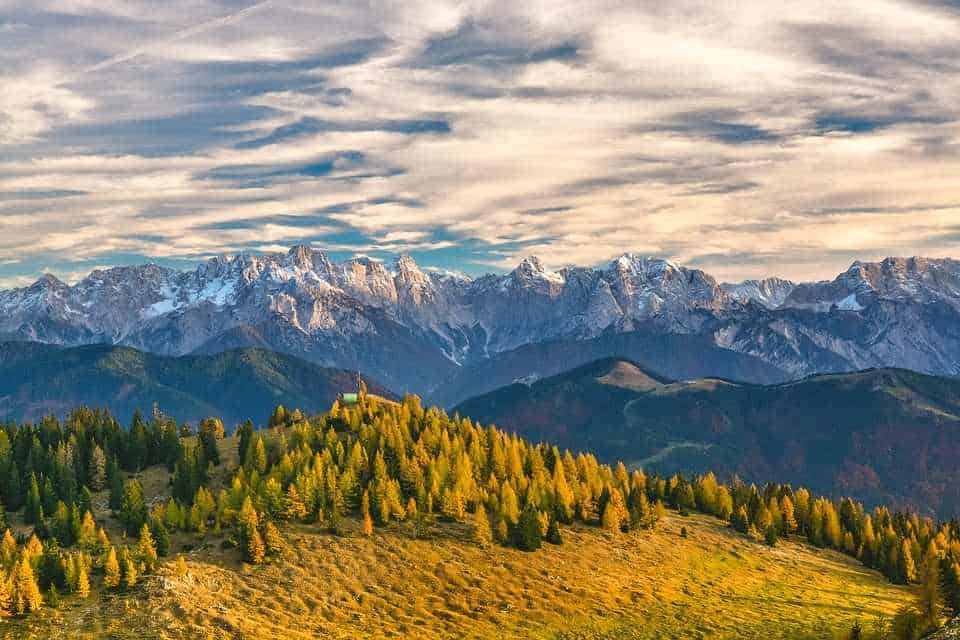
Located in central Europe sits the landlocked country of Austria. It shares borders with Germany, the Czech Republic, Slovakia, Hungary, Slovenia, Italy, Switzerland, and Liechtenstein. The country is divided into nine provinces: Vorarlberg, Tirol, Salzburg, Upper Austria, Carinthia, Styria, Burgenland, Lower Austria, and Vienna.
Present-day Austria finds its origins back in prehistoric times. The region was inhabited by Celtic people until it fell under Roman control during the first century. During the second century, Slavs, Germans, Huns, and Bohemians began to raid the country.
The country is known to Austrians as Osterreich, a name dating back to C.E. 800 when the emperor of the Germanic Franks, Charlemagne, took control of the region. In the tenth century, the german king Otto I named it Ostarichi, from which the name derives.
Today, Austria is a beautiful country with a lot to offer. The country is mountainous, holding the title of the winter sports center of Europe. The economy in the country is also very strong for those looking to start a business or invest overseas. Austria has quite a low unemployment rate and offers highly skilled professionals, who are willing to learn German, the opportunity to work among its bright citizens.
Fast Facts
- Capital: Vienna
- Official Language: German
- Area: 32,386 square miles
- Population: 8,700,000
- Currency: Euro (€)
Culture
The culture in Austria is heavily influenced by Germany. In fact, the official language is German. The dialects vary depending on the region. Slovene is the official language in the southern province of Carinthia. A very small population speaks Croatian and even less people speak Hungarian.
Austria is very well known for the arts. In the world of music, Austria is the birthplace of famous composers such as Johann Strauss, Arnold Schönberg, and Wolfgang Amadeus Mozart. During the 18th and 19th century, Vienna was the European capital for classical music, drawing in many composers.
Austrians have made many significant contributions to every aspect of arts and culture including science, literature, architecture, and more.
Geography and Climate
Austria is a very mountainous country due to its proximity to the Alps. In fact, Austria contains parts of the Central Eastern Alps, Northern Limestone Alps, and Southern Limestone Alps.The highest point is Grossglockner at 12,457 feet.
Early June to mid-September is summer, during which it can be hot one year and rainy the next. It usually reaches around 77 degrees during the day but can get as high as 95. Winter, from December to March, is cold in the lowlands and very harsh in the Alpine region.
Temperature fluctuates all year long in the Alpine region. Nights are chilly, even during the middle of summer. The northern Alps tend to be a lot wetter than the rest of the country. The southeast region of the country is dry and sunny.
Cost of Living
The cost of living overseas in Austria is quite high due to the strong economy and high standards of living.
- Housing – On average, renting costs are approximately €800 per month. There are more inexpensive options but you will want amenities and high quality accommodations. Buying an apartment unit costs around €100,000. You can expect to pay €200 to €250 per month on utilities.
- Transportation – Taxi rides are around €13. A one-way pass for bus, subway, or train is around €2. The cheapest way to use the public transportation is to buy a monthly pass for €50, if you plan on using it frequently. If you have a car, gas prices sit around €1.20 per liter.
- Food and Drink – Food will cost you around €400 a month, which includes groceries and dining out. For your monthly groceries, set aside around €300, since food can be expensive, depending on what you buy. A meal out ranges from €20 to €50 per person, or €6 at a fast food establishment.
- Healthcare – Most people are insured in the country, especially those who are employed. Private health insurance will cost you about €200 a month. A doctor’s visit is around €60.
Residency Options
There are a few different kinds of residency visas, depending on your reason for visiting Austria. Some of the options are listed below:
- Very Highly Skilled Permit -This permit is for highly qualified individuals looking to enter Austria for employment purposes. To qualify, you must possess a degree or similar qualification and your work must be of significant importance for the employer or area. Your work must have the potential to create jobs for locals and you must bring investment capital to the country.
- The Self-Employed Key Workers Permit – For those who seek to create a business in Austria on the condition that the business creates macroeconomic benefit.
- Long-Term Resident EU – This is issued to foreigners who have had the right to stay in Austria for the last 5 years.
- Settlement Permit without Gainful Employment -This permit is for retired persons in Austria or financially independent individuals.
- Family Reunification – For family members of resident permit holders who seek to reside in Austria for more than 6 months. There is a strict immigration quota, however, so it may take a couple years for your family to join you.
Citizenship
In the event that you obtain Austrian citizenship, you will be permitted to live and work in Austria, as well as anywhere in the European Union and Switzerland. Austria is ranked highly among the world’s strongest passports, allowing visa-free travel to many countries like the U.S. Under the Austrian Citizenship Act, citizens and family members enjoy full citizenship for life, which can be passed onto future generations.
